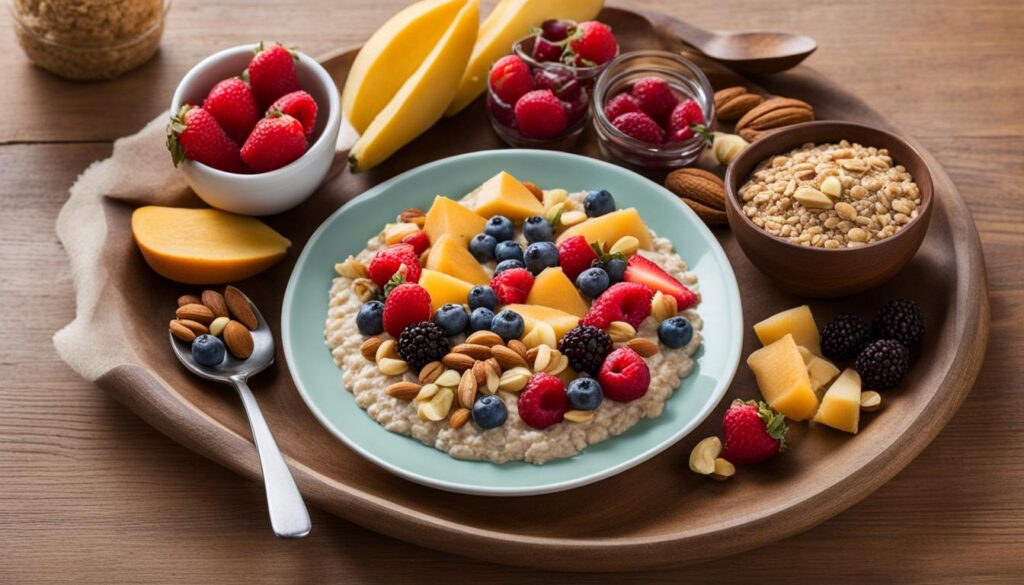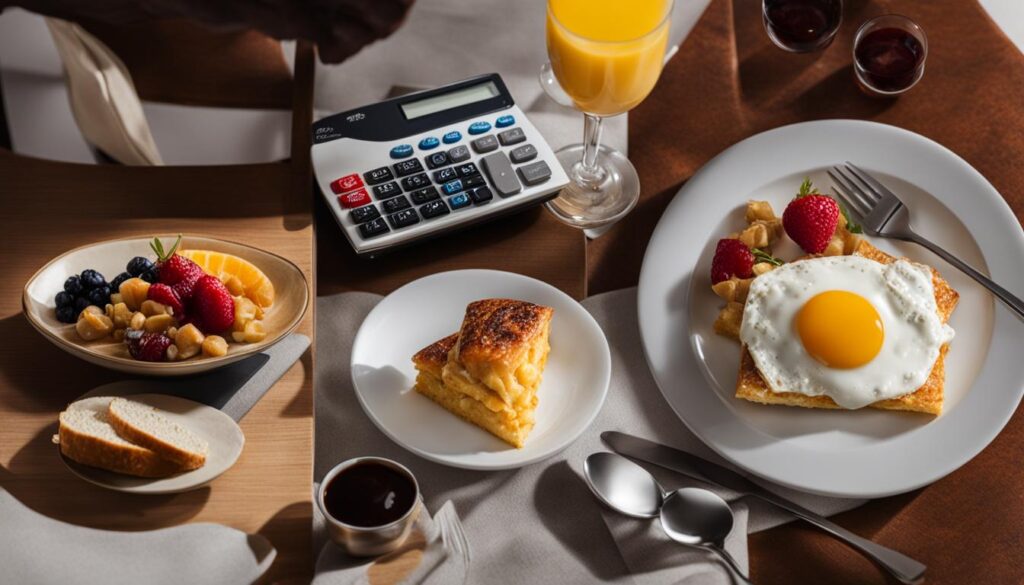Looking for ways to save money? Consider skipping breakfast! Skipping breakfast can be an effective strategy to stretch your budget and allocate those funds elsewhere. In this article, we’ll explore the financial benefits of skipping breakfast, provide frugal breakfast ideas, and offer practical tips to help you save money on your morning meal.

Key Takeaways:
- Skipping breakfast can be a practical way to save money and stretch your budget.
- By eliminating the cost of breakfast ingredients and meals, you can allocate those funds to other essential expenses or savings.
- This article provides frugal yet wholesome breakfast ideas and practical tips to save money on breakfast expenses.
- While skipping breakfast can save money, it’s important to weigh the nutritional costs and find alternative ways to meet your nutritional needs.
- By making mindful food choices, utilizing loyalty programs, and exploring alternative resources, you can save money on breakfast without compromising on nutrition or taste.
Understanding the Economic Impact of Skipping Breakfast
Skipping breakfast can have both positive and negative economic impacts. One factor to consider is the role of inflation on breakfast staples. Recent price increases in items like eggs, cereal, and coffee have made breakfast more expensive.
However, it is essential to assess the cost-benefit analysis of skipping breakfast by considering the savings from skipping meals and the potential long-term health implications.
The Role of Inflation on Breakfast Staples
Inflation plays a significant role in the rising costs of breakfast staples. The prices of essential items like eggs, cereal, and coffee have consistently increased over time. These increases can make it challenging for individuals to afford a nutritious breakfast on a tight budget.
Assessing the Cost-Benefit Analysis of Skipping Breakfast
When evaluating the economic impact of skipping breakfast, a cost-benefit analysis is essential. While skipping breakfast may save money in the short term, it is crucial to consider the long-term effects on health and well-being.
Skipping breakfast can potentially lead to reduced energy levels, decreased productivity, and increased risk of overeating later in the day. Additionally, individuals who skip breakfast may miss out on important nutrients and essential vitamins that can impact their overall health.
Therefore, it is essential to strike a balance between saving money and maintaining a healthy breakfast routine that provides the necessary nutrients for optimal well-being.
Save Money Skip Breakfast: Weighing Nutritional Costs
While skipping breakfast can save money, it’s important to weigh the nutritional costs. Breakfast provides essential nutrients and energy for the day. By skipping breakfast, individuals may miss out on vital vitamins, minerals, and fiber. It’s crucial to understand the health implications of skipping breakfast and find alternative ways to meet nutritional needs.
When we skip breakfast, we deprive ourselves of the opportunity to fuel our bodies with the nutrients it needs to start the day right. A balanced breakfast typically includes a mix of carbohydrates, protein, and healthy fats, along with essential vitamins and minerals. These nutrients provide the energy to kick-start our metabolism and keep us focused and alert throughout the morning.
Skipping breakfast can lead to a variety of health implications. Studies have shown that individuals who regularly skip breakfast are more likely to experience weight gain, have higher cholesterol levels, and have an increased risk of developing chronic diseases such as obesity, diabetes, and heart disease.
Alternative ways to meet nutritional needs without breaking the bank include opting for affordable and nutritious breakfast options such as oatmeal, whole-grain toast with nut butter, or yogurt with fresh fruits. These alternatives provide a good balance of nutrients while still being budget-friendly.

It’s important to prioritize our health and well-being while finding ways to save money. By considering the nutritional costs of skipping breakfast and making conscious choices, we can strike a balance between our financial goals and our long-term health.
Frugal Yet Wholesome: Budget-Friendly Breakfast Ideas
Eating on a budget doesn’t mean sacrificing nutrition. In fact, with a little creativity and planning, you can enjoy budget-friendly breakfasts that are both frugal and wholesome. These nutrient-dense breakfast options will keep you satisfied and help you save money at the same time.
Creating Nutrient-Dense Breakfasts for Less
One of the keys to a budget-friendly breakfast is selecting ingredients that are both affordable and nutrient-dense. Consider incorporating these cost-effective options into your morning meals:
- Eggs: A versatile and inexpensive source of protein and nutrients.
- Oats: A nutritious and filling breakfast staple that can be purchased in bulk for extra savings.
- Frozen fruits and vegetables: These budget-friendly options provide essential vitamins and minerals.
- Peanut butter: A budget-friendly source of protein and healthy fats.
By focusing on nutrient-dense ingredients, you can create a breakfast that is not only affordable but also nourishing for your body.
The Magic of Bulk Buying and Meal Prep
Another way to save money on breakfast is by harnessing the power of bulk buying and meal prep. Here’s how:
- Bulk buying: Purchase non-perishable breakfast items such as oats, nuts, and dried fruits in bulk. This allows you to take advantage of lower prices and ensures you always have nutritious options on hand.
- Meal prep: Preparing breakfast in advance can save you time and money. Consider making a large batch of overnight oats or a breakfast casserole that can be portioned and stored in the fridge or freezer for quick and easy meals throughout the week.
- Freezing: Don’t let leftover ingredients go to waste. Freeze overripe bananas for smoothies or use them to make homemade pancakes or oatmeal cookies. This helps reduce food waste and extends the life of your ingredients.
By incorporating these bulk buying and meal prep strategies into your breakfast routine, you can save money and enjoy nutritious meals with minimal effort.
Breakfast Myths Debunked: Do You Really Need the Morning Meal?
For years, we’ve been told that breakfast is the most important meal of the day. But is it truly necessary? Let’s dive into the scientific perspectives on breakfast habits and challenge the notion that breakfast is a must-have meal.
Exploring Scientific Perspectives on Breakfast Habits
There is much debate among scientists and researchers about the necessity of breakfast. Some studies suggest that skipping breakfast can have negative effects on metabolism, cognitive function, and overall health. However, other studies show that intermittent fasting and delaying the first meal of the day can have potential benefits, such as improved insulin sensitivity and fat metabolism.
It’s important to note that the impact of breakfast can vary depending on individual factors such as age, health status, and lifestyle. While some people may benefit from a balanced morning meal, others may find alternative eating patterns more suitable for their goals and preferences.
Challenging the ‘Most Important Meal’ Concept
The notion that breakfast is the most important meal of the day has been deeply ingrained in our culture. However, it is essential to critically examine this belief and consider alternative perspectives. The idea that skipping breakfast leads to weight gain or hinders productivity may not be as black and white as it seems.
Research suggests that the concept of the ‘most important meal’ originated from marketing campaigns rather than scientific evidence. As breakfast-related industries grew, so did the emphasis on the need for a substantial morning meal. However, it is important to distinguish between marketing tactics and scientific research when making dietary choices.
Alternative eating patterns, such as intermittent fasting, have gained popularity in recent years. These patterns challenge the traditional notion of breakfast and encourage individuals to listen to their bodies’ natural hunger cues rather than adhering to strict meal timings.
To summarize, breakfast myths have long been perpetuated, but the scientific perspectives on breakfast habits offer a different outlook. It’s crucial to consider individual needs, goals, and preferences when deciding whether breakfast is necessary or if alternative eating patterns can be beneficial for overall wellbeing.
Money-Saving Breakfast Tips Without Compromise
In today’s fast-paced world, finding ways to save money without compromising on nutrition or taste is crucial. Breakfast, being the most important meal of the day, offers numerous opportunities to cut costs without sacrificing quality. In this section, we will explore practical strategies for saving money on breakfast, including maximizing loyalty programs and coupons, as well as alternative nutritional resources for those on tight budgets.
Maximizing Loyalty Programs and Coupons
Loyalty programs and coupons are excellent tools for reducing breakfast expenses. Many food establishments, such as restaurants, coffee shops, and grocery stores, offer loyalty programs that reward frequent customers with discounts, free items, or exclusive deals. By signing up for these programs, individuals can save money on their regular breakfast purchases and even receive special offers tailored to their preferences.
“I always make sure to join the loyalty programs of my favorite breakfast spots. Not only do I get to enjoy tasty meals, but I also save money with every visit!” – Samantha, a loyal breakfast enthusiast.
In addition to loyalty programs, coupons are an effective way to cut down on breakfast costs. Whether they are from newspaper inserts, online coupon platforms, or loyalty program apps, coupons can provide significant savings on breakfast items. It is worth dedicating some time to search for coupons, as they can make a substantial difference in your breakfast budget.

Alternative Nutritional Resources for Tight Budgets
When money is tight, finding alternative nutritional resources for breakfast becomes essential. It’s important to remember that a nutritious breakfast doesn’t have to be expensive. Consider exploring community programs and food assistance resources that can provide affordable and healthy breakfast options.
Local community programs, such as food banks, often distribute fresh produce, grains, and other breakfast essentials at no cost or at a significantly reduced price. These resources can help individuals maintain a nutritious breakfast routine while minimizing expenses. Additionally, some organizations offer cooking workshops and classes that teach budget-friendly meal preparation techniques, ensuring that even with limited funds, individuals can still enjoy a hearty and wholesome breakfast.
- Visit your local food bank to explore available breakfast options.
- Participate in community cooking workshops to learn budget-friendly recipes.
- Connect with local organizations that provide food assistance to individuals in need.
By utilizing these alternative resources, individuals can save money on breakfast while still enjoying the nutritional benefits that a balanced morning meal provides.
In the next section, we will discuss the importance of finding the right balance between nutrition, savings, and practicality when it comes to breakfast choices.
Finding the Balance: Nutrition, Savings, and Practicality
When it comes to breakfast choices, finding the right balance between nutrition, savings, and practicality is crucial. By making mindful food choices, prioritizing nutrient-dense options, and employing budget-friendly strategies, you can create a breakfast routine that works for both your budget and your health.
Start by making mindful food choices. Opt for whole, unprocessed foods that provide essential nutrients without breaking the bank. Fresh fruits, vegetables, whole grains, and lean proteins are excellent choices for a balanced breakfast. Avoid sugary cereals, pastries, and processed foods that offer little nutritional value.
Prioritizing nutrient-dense options ensures that your breakfast is not only budget-friendly but also nourishing. Include foods that are rich in vitamins, minerals, and fiber to support your overall health. Incorporate ingredients such as eggs, Greek yogurt, nuts, and seeds, which are not only affordable but also highly nutritious.
To save money on breakfast, it’s important to implement practical strategies. Here are some budget-friendly solutions:
- Buy in bulk: Purchasing staple items like oats, rice, and dried fruits in bulk can help you save money in the long run.
- Meal prep: Dedicate some time each week to prepare breakfast in advance. This way, you can save money by avoiding expensive takeout or convenience foods.
- Shop smart: Look for sales, coupons, and discounts when buying breakfast ingredients. Compare prices at different stores to ensure you’re getting the best deals.
- Get creative: Experiment with affordable ingredients and try new recipes. Simple dishes like overnight oats, smoothies, and egg muffins can be both inexpensive and delicious.
By finding the balance between nutrition, savings, and practicality, you can ensure that breakfast becomes a fulfilling and economical part of your daily routine.
Breakfast Inflation: The Numbers Behind the Savings
When it comes to saving money on breakfast, breakfast inflation plays a crucial role. It is essential to understand the numbers behind breakfast savings and how price increases in breakfast foods can impact your budget. By comparing year-over-year price increases of common breakfast items, you can gain insights into the economic indicators of breakfast inflation and make informed decisions about your breakfast choices.
Comparing Year-Over-Year Price Increases of Breakfast Foods
To get a clear understanding of breakfast inflation, it is important to compare the price increases of different breakfast foods over time. The cost of breakfast staples, such as eggs, cereal, and coffee, can fluctuate due to various economic factors. By analyzing these year-over-year price increases, you can identify trends and anticipate future changes in breakfast expenses.

Egg Prices Surge: An Economic Indicator to Consider
Eggs are a versatile and popular breakfast food, making them an important economic indicator when assessing breakfast inflation. Fluctuations in egg prices can have a significant impact on the overall cost of breakfast. Whether it’s due to supply and demand factors, transportation costs, or other market influences, monitoring egg prices can provide valuable insights into the broader economic trends affecting breakfast expenses.
| Breakfast Food | Price Increase (YoY) |
|---|---|
| Eggs | +8% |
| Bread | +6% |
| Bacon | +10% |
| Coffee | +5% |
| Cereal | +7% |
The table above illustrates the year-over-year price increases of common breakfast foods. These numbers provide a snapshot of the impact of breakfast inflation on your wallet and can help you make more informed decisions about your breakfast routine.
The Societal Stance on Breakfast: Luxury or Necessity?
The societal stance on breakfast can vary, with some considering it a luxury while others view it as a necessity. Cultural perceptions of breakfast routines play a significant role in shaping individuals’ attitudes towards breakfast and their dietary decisions. These perceptions are influenced by various factors including personal choices, cultural norms, and economic strain.
Shifting Cultural Perceptions of Breakfast Routines
Breakfast routines and traditions have evolved over time, reflecting the changing cultural landscape. In some cultures, breakfast is considered a leisurely meal, emphasizing quality time spent with family or friends. In others, it may be a quick and efficient way to fuel the body for the day ahead. These cultural perceptions of breakfast routines can influence individuals’ preferences and behaviors when it comes to breakfast.
How Economic Strain Influences Dietary Decisions
Economic strain can have a profound impact on individuals’ dietary decisions, including their breakfast choices. When facing financial constraints, some may prioritize allocating limited resources to other essential expenses, resulting in a skipped or minimalistic breakfast. Economic considerations may also lead individuals to opt for more budget-friendly breakfast alternatives or explore creative ways to save money on breakfast expenses.

Understanding the societal stance on breakfast and the cultural perceptions surrounding breakfast routines is crucial in exploring the relationship between breakfast, personal choices, and economic strain. It provides insights into the complex interplay of cultural, social, and economic factors that shape individuals’ breakfast habits and dietary decisions.
Practical Ways to Save Money on Breakfast Expenses
This section provides practical ways to save money on breakfast expenses. By implementing these strategies, you can stretch your budget while still enjoying a satisfying morning meal.
Shopping Smarter: Where to Find Affordable Breakfast Alternatives
When it comes to saving money on breakfast, shopping smarter is key. Consider these tips:
- Buy in bulk: Purchasing breakfast staples like oats, nuts, and dried fruits in bulk can significantly reduce costs. Not only will you save money, but you’ll also have a steady supply of ingredients for mornings to come.
- Explore store brands: Look beyond popular name brands and explore store brands. They often offer similar quality at a lower price.
- Compare prices: Take the time to compare prices at different grocery stores or online retailers. You may be surprised by the price variations and discover more affordable options.
- Utilize coupons and loyalty programs: Keep an eye out for coupons and take advantage of loyalty programs offered by your favorite breakfast food brands or grocery stores.
- Shop seasonal produce: Incorporating seasonal fruits and vegetables into your breakfast routine can help reduce costs while enjoying the freshest ingredients.
DIY Breakfast Solutions That Protect Your Pocket
Another practical way to save money on breakfast is by preparing meals at home. DIY breakfast solutions allow you to control ingredients, portions, and costs. Consider these affordable and delicious options:
- Egg muffin cups: Whip up a batch of egg muffin cups using ingredients like eggs, vegetables, and cheese. They can be pre-made and stored in the fridge or freezer, making for a convenient and inexpensive breakfast option.
- Homemade granola: Create your own granola using oats, nuts, seeds, and dried fruits. Not only is it more cost-effective compared to store-bought varieties, but you can also customize the flavors to your liking.
- Oatmeal jars: Prepare overnight oats in portable jars by layering oats, milk, yogurt, and your choice of toppings (such as fresh fruits, nuts, or honey). These jars can be made in advance and refrigerated, providing a quick and budget-friendly breakfast.
- Smoothie packs: Save money on premade smoothies by preparing smoothie packs with frozen fruits and vegetables. Portion them out in ziplock bags and store them in the freezer for an easy grab-and-blend breakfast.
- Breakfast sandwiches: Make your own breakfast sandwiches by toasting English muffins or bagels, adding some eggs, cheese, and your preferred breakfast meat. Store them in the freezer for a quick and satisfying morning meal.
Incorporating these practical tips into your breakfast routine can help you save money without compromising on taste or nutrition. By shopping smart and embracing DIY solutions, you can enjoy a delicious and budget-friendly breakfast every day.

Conclusion
In conclusion, this article has highlighted the financial benefits of skipping or altering breakfast routines. By eliminating the cost of breakfast ingredients and meals, individuals can save money and allocate those funds to other essential expenses or savings. However, it is important to balance economic needs with health for long-term wellbeing.
The potential savings from skipping breakfast can be significant, allowing individuals to stretch their budget and improve their financial situation. However, it is crucial to recognize the nutritional costs of skipping breakfast and find alternative ways to meet one’s dietary needs. While breakfast provides essential nutrients and energy for the day, there are frugal yet wholesome breakfast ideas that can help save money without compromising on nutrition.
By making mindful food choices, maximizing loyalty programs and coupons, and exploring alternative nutritional resources, individuals can find the right balance between saving money and maintaining good health. It is important to personalize breakfast habits based on unique financial situations and health goals, as everyone’s needs and circumstances are different. By doing so, individuals can achieve long-term wellbeing while also achieving their financial goals.
FAQ
Can skipping breakfast really save me money?
Yes, skipping breakfast can be a practical way to save money and stretch your budget by eliminating the cost of breakfast ingredients and meals.
What is the economic impact of skipping breakfast?
Skipping breakfast can have both positive and negative economic impacts. It’s important to consider the potential long-term health implications and assess the savings from skipping meals.
Is skipping breakfast bad for my health?
Skipping breakfast may cause individuals to miss out on essential nutrients, vitamins, minerals, and fiber. It’s crucial to find alternative ways to meet nutritional needs if you choose to skip breakfast.
Are there budget-friendly breakfast alternatives that are still nutritious?
Yes, there are many creative and affordable breakfast ideas that provide nutrition without breaking the bank. This includes using affordable ingredients, bulk buying, and meal preparation.
Is breakfast really the most important meal of the day?
The concept of breakfast being the most important meal has been challenged. Scientific perspectives show that alternative eating patterns, like intermittent fasting, can be beneficial for some individuals.
How can I save money on breakfast without compromising on nutrition or taste?
You can save money on breakfast expenses by maximizing loyalty programs and using coupons. Additionally, there are alternative nutritional resources available for individuals on tight budgets.
How do I find the right balance between nutrition and savings when it comes to breakfast choices?
Finding the balance involves making mindful food choices, prioritizing nutrient-dense options, and using budget-friendly strategies. It’s important to consider your individual preferences and needs.
How does breakfast inflation affect my breakfast savings?
Breakfast inflation, including price increases of common breakfast foods like eggs, cereal, and coffee, can impact your breakfast savings over time.
What is the societal stance on breakfast and how does it influence my breakfast habits?
The societal stance on breakfast can vary, with some considering it a luxury and others viewing it as a necessity. Cultural perceptions and financial circumstances often influence breakfast routines.
Are there practical ways to save money on breakfast expenses?
Yes, shopping smarter for affordable breakfast alternatives and using DIY breakfast solutions can help you save money on breakfast expenses.
